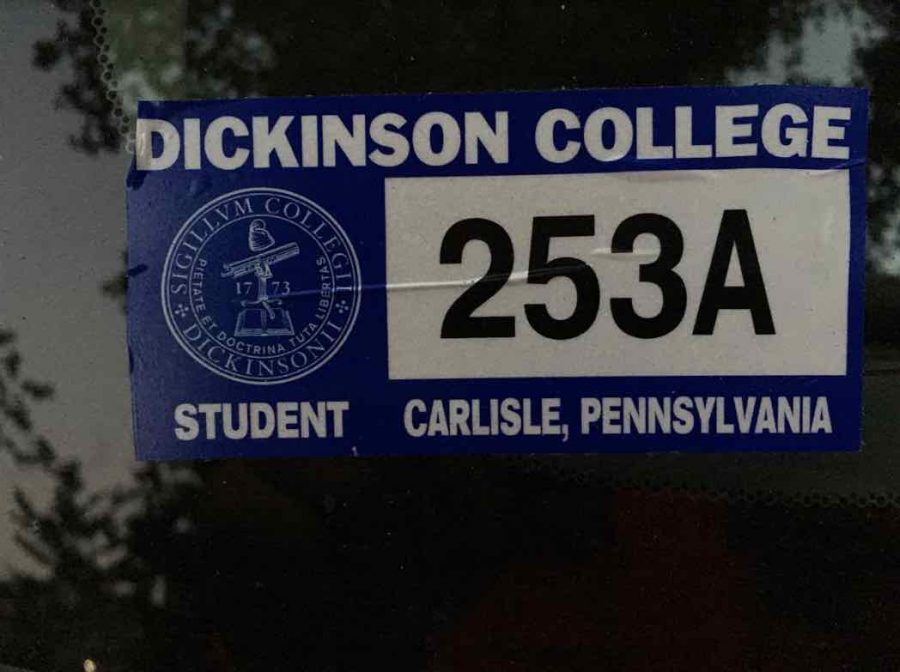Parking Fines for Unregistered Vehicles Nearly Double
Photo Courtesy of Ian Ridgeway ’19
A parking sticker on a registered student car. Vehicle registration in the DPS office has no cost.
The existing fine of $25 for parking an unregistered vehicle has nearly doubled this year, among other parking changes that are being phased in before spring 2018.
The new fine for parking an unregistered vehicle is $45 with an additional fine of $100 for subsequent offenses. The fine for parking a registered vehicle in an improper lot remains the same for the initial offense, $25, but has increased to $50 for multiple violations.
The changes in parking fees is one of a series of parking changes in the works. According to Kenneth Shultes, Associate Vice President of Sustainability and Facilities Planning, Dickinson’s Finance and Administration Division is overseeing the updating of parking policies.
Vehicle registration is free, and will remain so for the foreseeable future, despite changes in parking policy. A vehicle can be registered in the Department of Public Safety (DPS) office with a valid driver’s license and vehicle registration.
The division is changing policies to keep up with “the upcoming construction and opening of our new residence hall, emergency preparedness (big snow events last year in particular), and sustainability goals,” says Shultes.
Shultes explains that in an effort to promote carbon-free modes of transportation such as walking, biking or carpooling, the division has also discussed a plan to “designate peripheral parking areas on campus for sophomores.”
Through meetings with Carlisle residents who live close to the construction, it became clear to the Finance and Administration Group that changes on campus were necessary, said Shultes. The first step in this new parking policy is to increase vehicle registration with DPS.
The committee also plans to gather input from students before any more changes are finalized.
“[Registration] is the foundation to any parking policy since it provides improved compliance and communications,” says Shultes.
While looking into parking policies and illegally parked cars on campus, Shultes observed that people may not understand the reason for marked areas on the pavement prohibiting parking adjacent to some handicap parking spaces.
“These areas are hatched-out to prevent people from parking there… [The areas] allow room for a wheel chair to exit and enter the vehicle.”
Shultes also brought up safety issues created by staff and student cars left in parking lots over winter break. “Last year’s winter storms provide the perfect example for why we need to upgrade our policies,” says Shultes. As crews from facilities tried to plow record amounts of snowfall, the parked cars provided obstacles and safety hazards.
These policy changes will still allow students and faculty to park in the “designated break lots” as long as permission is granted from DPS. According to Shultes, there are also plans in the works to educate students on current parking policies. He says there is a group that is “tasked with clarifying and communicating this policy and it will be shared with the campus community prior to fall pause in October.”
All new parking policies are expected to be in place by spring 2018 as the new residence hall will be ready for use in the fall of 2018.







Mark Hammond • Sep 8, 2016 at 10:09 am
I knew people who didn’t get parking stickers and parked on the street. Can the college fine you for that?